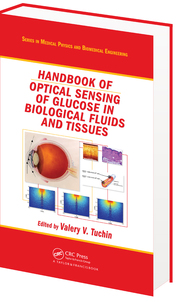Handbook of Optical Sensing of Glucose in Biological Fluids and Tissues

Although noninvasive, continuous monitoring of glucose concentration in blood
and tissues is one of the most challenging areas in medicine, a wide range of
optical techniques has recently been designed to help develop robust noninvasive
methods for glucose sensing. For the first time in book form, the Handbook of
Optical Sensing of Glucose in Biological Fluids and Tissues analyzes trends
in noninvasive optical glucose sensing and discusses its impact on tissue optical
properties.
This handbook presents methods that improve the accuracy in glucose prediction
based on infrared absorption spectroscopy, recent studies on the influence of
acute hyperglycemia on cerebral blood flow, and the correlation between diabetes
and the thermo-optical response of human skin. It examines skin glucose monitoring
by near-infrared spectroscopy (NIR), fluorescence-based glucose biosensors,
and a photonic crystal contact lens sensor. The contributors also explore problems
of polarimetric glucose sensing in transparent and turbid tissues as well as
offer a high-resolution optical technique for noninvasive, continuous, and accurate
blood glucose monitoring and glucose diffusion measurement.
Written by world-renowned experts in biomedical optics and biophotonics, this
book gives a complete, state-of-the-art treatise on the design and applications
of noninvasive optical methods and instruments for glucose sensing.
Click here for further information
Terms
While we only use edited and approved content for Azthena
answers, it may on occasions provide incorrect responses.
Please confirm any data provided with the related suppliers or
authors. We do not provide medical advice, if you search for
medical information you must always consult a medical
professional before acting on any information provided.
Your questions, but not your email details will be shared with
OpenAI and retained for 30 days in accordance with their
privacy principles.
Please do not ask questions that use sensitive or confidential
information.
Read the full Terms & Conditions.